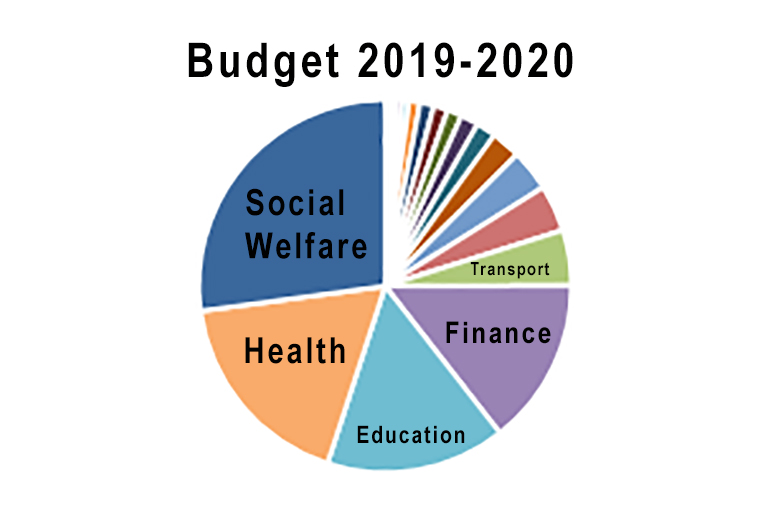By Alfred Kim
The New Zealand Government proposed a new approach to the Budget on 30 May 2019: one that aims to instil hope for better “living standards over the long-term,” by providing support for the “many possible definitions of wellbeing.” This purpose of this article is to make sense of how the Government plans to achieve these aims.
The Budget Policy Statement introduces key concerns of New Zealand Wellbeing, including:
- “In any 12-month period, about one in five New Zealanders will have a diagnosable mental illness, with three-quarters of lifetime cases starting by the age of 25.”
- “Material standards of living for Pacific people is around half that of the general population, and a third lower for Māori.”
- “Up to 300,000 children live in poverty or hardship in New Zealand, and leading to lasting wellbeing impacts in areas such as health, housing, and education.”
These issues have persisted long enough and now it has forced the government to investigate refreshing their Budget approach.
The Government’s approach consists of five priorities based on initial evidence from The Treasury’s Living Standards Framework under which there is a set of strategies that describes how to achieve these priorities. Evidence supposedly shows considerable opportunities to make a difference in New Zealanders’ wellbeing. The priorities have been refined under consultations with officials, Ministers, sector experts, and Government Science advisors, and other inputs, including international evidence.[1] The following are the government’s five priorities for wellbeing.
https://www.interest.co.nz/news/100030/budget-2019-summary-all-spending-plans
Taking mental health seriously
Labour has expressed that they “are taking mental health seriously with the biggest investment in mental health, in any Budget, ever.”[2] Some may say that the use of “seriously” is sensationalistic; a larger investment in mental health is similar to previous budgets. Nonetheless, the Mental Health Foundation (MHF) is pleased with this initiative, calling it “a good start towards transformational change”. MHF chief executive Shaun Robinson further elaborates, “The funding and initiatives set out in today’s budget are a fantastic start, but it’s crucial Government keep up the momentum into the future if we are to create a New Zealand where all people can experience positive mental health. We are pleased to see the Minister acknowledge that more funding will be needed over multiple years.”[3]
There will be a record $1.9 billion total Mental Health Package, including investments in a new universal frontline mental health service, mental health and addiction facilities, the Housing First programme, and programmes and resources for primary and intermediate schools. If you want to know more about the programmes which apply to you, there is more information on the Ministry of Health’s website. https://www.health.govt.nz/our-work/mental-health-and-addictions/budget-2019-mental-health-wellbeing-and-addiction-initiatives
Although it may be argued that the investment proposed is substantial, the knock-on effect will likely negate the economic cost in the long run. It is estimated that in 2014 alone, the “economic cost of serious mental illness was $12 billion, or five percent of Gross Domestic Product (GDP).” Improving mental health is likely to increase the productivity and prosperity of New Zealand as a whole.[4]
Improving child wellbeing
One way in which the Budget goes beyond simply financial considerations is its investment into children’s health. Investment areas include Oranga Tamariki, a new intensive intervention service for working with families to keep children safe at home, new small community-based homes, building on the Ministry’s strategic partnerships and relationships with iwi and Māori organisations to help over-represented Māori in care systems, removing compulsory school donations and NCEA fees to take financial pressure off parents and more.[5]
Evidence shows that childhood experiences lay the foundation for healthy development and positive outcomes later in life. The extent of impact any of these investments may have towards improving child wellbeing are, of course, open to debate, discussion, and qualitative research. However, it seems promising as evidence shows that childhood experiences lay the foundation for healthy development and positive outcomes throughout the rest of life. There is an acknowledgement that punitive sanctions do more to hurt than help those who are on the benefit. Under this priority, the Government hopes to address structural determinants of wellbeing early on in life and take financial pressure off parents by increasing funding.[6]
Supporting Maori & Pasifika aspirations
According to Hon Kelvin Davis, “the Wellbeing Budget focuses on ways to give Māori and Pacific peoples more scope to lift their own wellbeing,” a sentiment echoed by many ministers. This statement seems to be an indicator that the government is an advocate for responsible investment and initiatives for increasing wellbeing. Key initiatives include support for te reo Māori and Pacific languages, targeted funding for improved health, housing, education and skills, a Kaupapa Māori approach to tackling reoffending and an $80 million boost for Whānau Ora.
The same release states “when Māori and Pacific people set their own wellbeing goals and aspirations and when we as a Government use our ability to change the system and help Māori and Pacific peoples achieve those aspirations – equality can start to be a reality.” The Government has an emphasis on tailoring towards Māori and Pacific peoples culture because “targeted and tailored initiatives are shown to be more effective for improving both Māori and Pacific peoples’ health outcomes.”[7] We have also seen these types of cultural, health initiatives from several different Ministries in the past, including: He Korowai Oranga: Maori Health Strategy and the Pacific Health Action Plan from the Ministry of Health, Māori Tertiary Education Framework from the Ministry of Education, and more. We will have to wait and see whether the government’s targeted investment will end up helping these Ministries in their plans. In the end, it is these Ministries’ responsibility that the investments are effective. As with all issues regarding cultures, this issue regarding “equality” is complex and requires further maintenance and development of relationships between government and related parties.
nzherald.co.nz/nz/news/article.cfm?c_id=1&objectid=12235571
Building a productive nation
This priority focuses on better equipping people for life after school, innovation for the future, strength in work, and filling the venture capital gap in order to keep more start-ups in New Zealand for longer.[8] These initiatives help New Zealand’s long term wellbeing, by working towards a sustainable economy.
Transforming the economy
As with the previous priority, this priority is also economically motivated, but more focused on economic growth rather than sustainability. It includes investment in KiwiRail, sustainable land use, scientific research around climate change, Te Uru Rākau, and the waste problem.[9]
https://www.newzealand.com/int/auckland/
Conclusion
New Zealand’s Wellbeing Budget is not a radically new approach to the world; it has taken place in many forms at countries such as the UAE and Bhutan, each with their measures of happiness. In the Budget, the last two priorities are traditional approaches to long term economic wellbeing. However, the spotlight is on the other three priorities, where the influence of economic policy on wellbeing is changing. At the World Economic Forum in January of this year, Prime Minister Jacinda Ardern said that growth should not just be for growth’s sake; instead it is crucial to ask “How is [the people’s] overall well-being and their mental health. How is our environment doing? These are the measures that will give us a true measure of our success.” [10] Do you agree? What do you think about these priorities?
References:
[1]https://budget.govt.nz/budget/pdfs/bps/bps-2019.pdf
–
[2] https://www.labour.org.nz/taking_mental_health_seriously
[3]https://www.beehive.govt.nz/release/taking-mental-health-seriously
–
[5]https://www.beehive.govt.nz/release/improving-child-wellbeing
[6]https://www.budget.govt.nz/budget/2019/wellbeing/child-wellbeing/index.htm
[7]https://www.beehive.govt.nz/release/supporting-m%C4%81ori-and-pasifika-aspirations
[8]https://www.beehive.govt.nz/release/building-productive-nation
[9]https://www.beehive.govt.nz/release/transforming-economy
–
[10]https://www.weforum.org/agenda/2019/05/new-zealand-is-publishing-its-first-well-being-budget/
–
Featured Image: newshub.co.nz/home/politics/2019/05/live-updates-budget-2019-to-be-released-after-week-of-drama.html
The Public Policy Club is a non-partisan club at the University of Auckland that aims to encourage, educate and involve students from all backgrounds in the education and development of political knowledge. The views and opinions expressed in this article are those of the author and do not necessarily reflect those of PPC.


 https://www.interest.co.nz/news/100030/budget-2019-summary-all-spending-plans
https://www.interest.co.nz/news/100030/budget-2019-summary-all-spending-plans/arc-anglerfish-syd-prod-nzme.s3.amazonaws.com/public/6EJEVKBV6FGBTO54RJK7HAZNME.jpg) nzherald.co.nz/nz/news/article.cfm?c_id=1&objectid=12235571
nzherald.co.nz/nz/news/article.cfm?c_id=1&objectid=12235571


